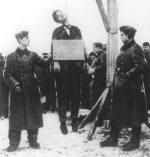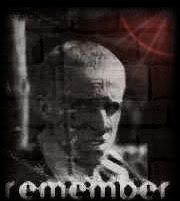Divider
Seraphim
- Член од
- 24 февруари 2005
- Мислења
- 27.337
- Поени од реакции
- 3.062
Zoya Anatolyevna Kosmodemyanskaya (Космодемьја́нскаја, Зо́ја Анато́льевна in Russian) (September 13, 1923 - November 29, 1941) was a Soviet partisan, Hero of the Soviet Union (posthumously).
Kosmodemyanskaya joined the VLKSM in 1938. In October of 1941, still a high school student in Moscow, she volunteered for a partisan unit. At the village of Obukhovo near Naro-Fominsk, Kosmodemyanskaya and other partisans crossed the front line and entered territory, occupied by the Germans. She was arrested by the Nazis on a combat assignment near the village of Petrischevo (Moscow Oblast) in late November 1941. Kosmodemyanskaya was savagely tortured and humiliated, but did not give away the names of her comrades or her real name (claiming that it was Tanya). She was hanged on November 29, 1941. It was claimed that before her death Kosmodemyanskaya had made a speech with the closing words, “There are two hundred million of us, you can’t hang us all!” Kosmodemyanskaya was the first woman to become Hero of the Soviet Union (February 16, 1942).
Many streets, kolkhozes and pioneer organizations in the Soviet Union used to bear the name of Zoya Kosmodemyanskaya. Soviet poets, writers, artists and sculptors dedicated their works to Kosmodemyanskaya. The Soviets erected a monument in her honor not far from the village of Petrischevo (sculptors - O.A.Ikonnikov and V.A.Feodorov). Two asteroids were named after her: 1793 Zoya and 2072 Kosmodemyanskaya. Zoya Kosmodemyanskaya was buried in Moscow.
Zoya Kosmodemyanskaya's brother Alexander (1925 - April 13, 1945), a Senior Lieutenant, died in combat in Germany and was posthumously awarded Hero of the Soviet Union in 1945.
Kosmodemyanskaya joined the VLKSM in 1938. In October of 1941, still a high school student in Moscow, she volunteered for a partisan unit. At the village of Obukhovo near Naro-Fominsk, Kosmodemyanskaya and other partisans crossed the front line and entered territory, occupied by the Germans. She was arrested by the Nazis on a combat assignment near the village of Petrischevo (Moscow Oblast) in late November 1941. Kosmodemyanskaya was savagely tortured and humiliated, but did not give away the names of her comrades or her real name (claiming that it was Tanya). She was hanged on November 29, 1941. It was claimed that before her death Kosmodemyanskaya had made a speech with the closing words, “There are two hundred million of us, you can’t hang us all!” Kosmodemyanskaya was the first woman to become Hero of the Soviet Union (February 16, 1942).
Many streets, kolkhozes and pioneer organizations in the Soviet Union used to bear the name of Zoya Kosmodemyanskaya. Soviet poets, writers, artists and sculptors dedicated their works to Kosmodemyanskaya. The Soviets erected a monument in her honor not far from the village of Petrischevo (sculptors - O.A.Ikonnikov and V.A.Feodorov). Two asteroids were named after her: 1793 Zoya and 2072 Kosmodemyanskaya. Zoya Kosmodemyanskaya was buried in Moscow.
Zoya Kosmodemyanskaya's brother Alexander (1925 - April 13, 1945), a Senior Lieutenant, died in combat in Germany and was posthumously awarded Hero of the Soviet Union in 1945.





